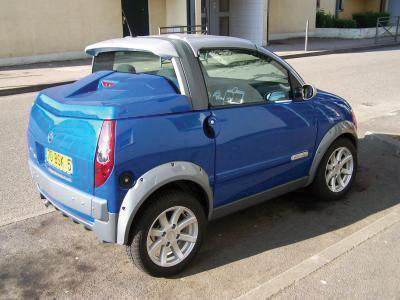4 Crazy French Laws You Might Not Know
Being the curious foreigner that I once was in Paris, there was a time I wanted to photograph everything in order to fully document my experience. Unfortunately for me, the group of Parisian police officers rushing to the door of my third floor apartment made it very clear that I was not allowed to photograph […]

Being the curious foreigner that I once was in Paris, there was a time I wanted to photograph everything in order to fully document my experience. Unfortunately for me, the group of Parisian police officers rushing to the door of my third floor apartment made it very clear that I was not allowed to photograph everything in public view. One night, my American roommate and I were distracted by a street commotion, cameras in hand we were ready to see firsthand what a Parisian conflict looks like and how it is regulated. A few snaps and some absurdly bright camera flashes later, we found three rather intimidating police officers banging on our door. Upon opening the door, they entered, grabbed both of our cameras, looked through every photo, and then proceeded to delete the photos we took of them, as well many others for unknown reasons. They proceeded to lecture us on the French law that forbids any videos or photographs to be taken of French law enforcement and military. This was so important to them that the criminals who caused the rumpus in the first place were let go without any questioning. You’re welcome!
Of course I know that France has different laws than the US, but I didn’t delve into the specifics before my first long-term excursion to Paris. Some of these laws are logical and were clearly made for the greater good of the county’s safety. Other laws come across as backwards, dangerous, and unfair, and they would not gain public favor anytime soon in the States. The difference in laws set forth explains more about the rebellious nature of the French than the government itself. The French lawmakers learned long ago that they could not stop the French from breaking the rules, so instead they developed laws that were more suited to the more common habits of the French.
1) The Car You Can Drive Without a License
One law that surprised me (with a mixture of disbelief and amusement) is that which allows drivers to drive without a license. France manufactures a vehicle suited for those unwilling to pay and study for an actual driving permit. This car is referred to as a “no license car.” The only requirements to obtain this car is to be at least eighteen years of age and to have money; No proof that you understand either the rules of the road or how to control the machine are necessary. These cars differ from regular cars because they are not built to drive long distances. They are meant to serve as city cars, and the maximum speed is 35mph. Needless to say, it is both frightening and annoying to share a road with these drivers. But, the government has little say in the matter, because it knows these people will find a way to drive, legally or not.
To make up for the those drivers on the road with no training or proof of safe instincts, the French government passed a law stating that every vehicle must have breathalyzers in the glove compartment, able to be shown upon request. Drivers pulled over without a breathalyzer are given an eleven Euro fine. This makes me feel a little safer on the streets, but not much. Those who are unaware of French leniency should know that the drinking limit before driving among civilians is rather different from that stated by law. The French will not think twice about driving after three or more servings of wine or beer. This, of course, is the “law abiding” French citizen; Many others will take the wheel under much higher levels of intoxication, hence the enforcement of breathalyzers in every car. It is a start, but there is more work to do in order to prevent alcohol-related car accidents in France.
On a similar note, eighteen year olds are granted the right to drink alcohol, drive, and smoke cigarettes all on the same day. Naturally, prudent Americans can see where this might lead to danger: an enthusiastic eighteen year old celebrating his birthday in the fashion of indulging in all of his newly obtained rights. First stop: buy cigarettes, then go smoke the entire box at the nearest bar. When the bar closes at two in the morning, instead of walking off the alcohol, why not take the new driving permit for a spin in dad’s car. Surprisingly, due to the high cost of obtaining a driver’s license in France, this trio of rights rarely causes any problems.
2) The Free Lodging Law
Long-term tourists and expatriates living in France know to what lengths even a wealthy French person will go in order to evade a payment or tax. The French government came to the rescue once again with the purpose of making swindling even easier for the average law abiding French citizen. In life, not every expense is necessary, and logically this is where frugal people will make their cuts. The French, on the other hand, take an opposite approach. Instead of cutting back on vacation and entertainment expenses, some French find it easier to just cut back on such menial costs as rent, food, and utilities. When it comes to diet: to each his own, but bills are bills and they need to be paid. Over the years, many have refused to pay rent and utilities, claiming that these are basic human needs and should be free.
Well, the government could not make these services free, but they did pass two laws that would make it easy for those who have no intention of paying. Any female with children under the age of eighteen has the right to electricity and water without paying her bills. Once all of the children in the household are of age, payment is requested or the services are shut off. Between October and the end of March, French law forbids any eviction. Rightfully assumed, many people in France seek out homeowners willing to fall for a sob story and, once situated, they do not pay rent. This guarantees them at least six months of free lodging. The eviction notice can be put into effect the first of April, and if owners wish to take the tenant to court they may, but this rarely happens due to court fees, the length of the process, and the fact that in the end they are not guaranteed compensation if the tenant proves he or she does not have the means to pay.
3) The Strict Sales
Coming from a capitalist nation, I naturally looked for bargains when I first came to France. I was first confused, complaining that everything was too expensive, and that basic marketing requires giving some discount here and there. Then I learned that the French do have sales, but just twice a year: once in the summer and once in winter, with neither legally allowed to last more than five weeks. These sales are regulated by the district’s police station, making the dates of sales differ slightly. If a particular store owner wishes to have a sale of any kind outside of these dates, he must submit a request to the police a month in advance. The restricted sales time in France makes it difficult for consumers, since everyone must fight for the same deals at the same time. By the time I usually find the courage to battle the crowds, there is nothing left in my size.
4) The 75% Tax
Being the Socialist nation that France is, the French are accustomed to both high taxes and a smaller standard of living gap between different classes. However, the current Socialist president of France, Francois Hollande, found a way to shock even French Socialist supporters. Hollande managed to convince French lawmakers to pass the “French Millionaire Tax,” which forces companies paying any employee over one million Euros a year to pay a 75% tax.
This caused an outrage from France’s rich, many of whom threatened to move outside of the country. Some, such as Gerard Depardieu, or shall we say, “Gerard Disparu,” (meaning Gerard, the one who disappeared) made good on that threat. The tax is only meant to last two years, but time will only tell if this tax is re-imposed at the end of the two years. This has created a backlash of sorts in France: many young people refuse to invest in a future that guarantees less money, even once one succeeds. Foreign investors are scared to invest in France with high taxes, and even though many rich stayed in France, many also left to countries less socialist. Hollande is a fast learner though, as he now wishes to pass a law that extends certain French taxes to anyone with French citizenship regardless of their country of residence. The French philosopher Jean-Jaqcues Rousseau once said, “Laws are always useful to those who possess and vexatious to those who have nothing.” Well Hollande, you’ve managed to prove one of the great philosophers in history wrong!
Our observations abroad lead us to analyze not only that particular country’s culture and policies, but also our own culture and policies in greater depth. Upon reflection of a foreign nation, we are left with the need to compare our nations, and self-analyze what changes would be beneficial. The French laws previously mentioned reflect France in a different light than what is currently known of its international image. Whereas Americans will not look to adopt any of these policies anytime soon, for the most part they are currently working for the citizens of France.
Jacqueline Perrier-Gillette is currently a resident of Paris, France, where she lives with her husband. Together the two of them operate their small translation company, giving Jacqueline the opportunity to observe the French and their culture up close. She is an avid reader, writer, and student of foreign languages.
By Jacqueline Perrier-Gillette





